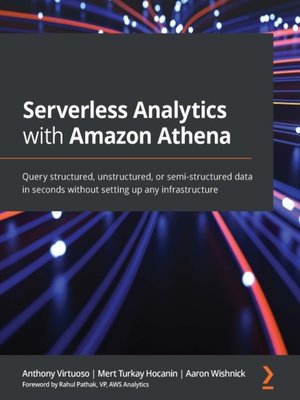Serverless Analytics with Amazon Athena
ebook ∣ Query structured, unstructured, or semi-structured data in seconds without setting up any infrastructure
By Anthony Virtuoso

Sign up to save your library
With an OverDrive account, you can save your favorite libraries for at-a-glance information about availability. Find out more about OverDrive accounts.
Find this title in Libby, the library reading app by OverDrive.



Search for a digital library with this title
Title found at these libraries:
| Loading... |
Get more from your data with Amazon Athena's ease-of-use, interactive performance, and pay-per-query pricing
Key FeaturesAmazon Athena is an interactive query service that makes it easy to analyze data in Amazon S3 using SQL, without needing to manage any infrastructure.
This book begins with an overview of the serverless analytics experience offered by Athena and teaches you how to build and tune an S3 Data Lake using Athena, including how to structure your tables using open-source file formats like Parquet. You'll learn how to build, secure, and connect to a data lake with Athena and Lake Formation. Next, you'll cover key tasks such as ad hoc data analysis, working with ETL pipelines, monitoring and alerting KPI breaches using CloudWatch Metrics, running customizable connectors with AWS Lambda, and more. Moving on, you'll work through easy integrations, troubleshooting and tuning common Athena issues, and the most common reasons for query failure. You will also review tips to help diagnose and correct failing queries in your pursuit of operational excellence. Finally, you'll explore advanced concepts such as Athena Query Federation and Athena ML to generate powerful insights without needing to touch a single server.
By the end of this book, you'll be able to build and use a data lake with Amazon Athena to add data-driven features to your app and perform the kind of ad hoc data analysis that often precedes many of today's ML modeling exercises.
What you will learnBusiness intelligence (BI) analysts, application developers, and system administrators who are looking to generate insights from an ever-growing sea of data while controlling costs and limiting operational burden, will find this book helpful. Basic SQL knowledge is expected to make the most out of this book.






